Words of Wisdom - Shastra
& Shastrakaras speak
For Books and shastra downloads see Main Index, under
Books:
Om Namo Bhagavate Vasudevaya
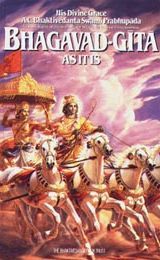

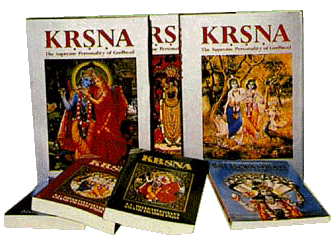
The Complete Works of Srila Prabhupada
All the books, the letters and conversations at your
fingertips
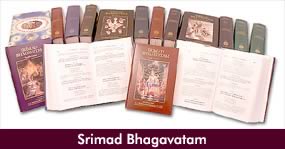
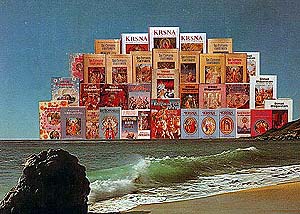
All Srila Prabhupada's books and more on one disk
http://www.vedabase.com




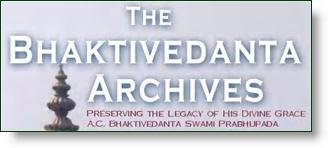
Srila Prabhupada's Audio lectures to listen to on-line:
http://www.hare-krishna.org/srila-prabhupada-lectures.htm
Listen to Srila A.C. Bhaktivedanta Swami Prabhupada on-line
- all 900 of his lectures are available HERE:
http://www.prabhupadavani.org/
Srimad Bhagavatam - the entire lecture series listen and
read along on-line - Narrated by Amala Bhakta dasa:
http://www.prabhupadavani.org/SB_index.html
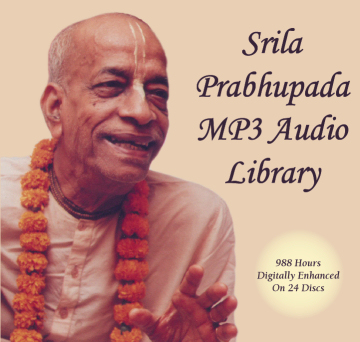
The new enhanced Prabhupada MP3 series
http://www.prabhupada.com/store/store.php?page=product.php&id=MP3AUDIOLIB

The Audio Srila Prabhupada Lilamrita
Please find enclosed details a being launched on Gaura Purnima day 2008.
It is a simple audio rendition of sections from "Prabhupada,
your ever well-wisher" by Satsvarupa dasa Goswami.
It was recorded here in the UK back in the mid '90's
by Bhagavat-Asraya prabhu (ACBSP) at my studio and I edited it into 8 short
instalments for inclusion on my weekly radio programme "Nectar of Devotion".
We had such a good response from listeners that it was
decided to add "The Audio Srila Prabhupada Lilamrita" to the Nectar of
Devotion website archive page.
In doing so I felt it might be nice to create a very simple,
seperate website for the Lilamrita.
The result is http://www.lilamrita.page.tl
It will be officially launched on Gaura Purnima day 2008
for the pleasure of Srila Prabhupada and all the Vaishnava's.
I hope this humble attempt will add to the growing appreciation
of Srila Prabhupada's remarkable achievements.
If other Krishna conscious radio stations would like
to broadcast this Lilamrita series they can contact me at devotion@nusoundradio.com
and I can send them mp3 copies.

Srila Prabhupada Vyasa-puja book 2007
http://www.krishna.com/node/1048
Vyasa-puja is an annual celebration by the devotees of Lord Krishna
to offer homage to their guru, or spiritual teacher.
There are two versions of the Vyasa Puja Book based on the speed of
your internet connection.
If you are unable to open the file, download Acrobat Reader.
High speed connections, with pictures.
Vyasa-puja
Book 2007 [PDF/ZIP, 2.11MB]
Low speed connections, no pictures.
Vyasa-puja
Book 2007 (no pictures) [PDF/ZIP, 2.11MB]








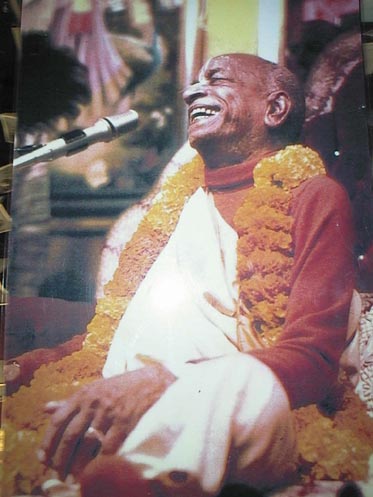
Visit "Prabhupada Connect" for all manner of Prabhupad
Nectar:
http://www.prabhupadaconnect.com/Index.html
Srila Prabhupada's Final Lesson Video - Downloadable and
viewing on-line
http://users.iskconludhiana.com/images/thumbnails.php?album=21
All pictures of Srila Prabhupad (19, 494)
http://www.iskconmedia.com/photos/Prabhupada_All_Photos/


All Srila Prabhupada's original books
available for sale here.

Download all the Hare Krsna teachings which includes
all Vaisnava and
Vedic concepts by visiting one of the sites listed at
the following address.
http://www.geocities.com/suci123/bookdownloadsites1.html
The Bhaktivedanta Book Trust
Srila Prabhupad Memorial Library
http://www.krishna.com/main.php?id=33


33 Books Online Including Srimad Bhagavatam!
http://www.geocities.com/freeprabhupadabooks
The compressed "self extracting" file mentioned is now currently
available for download
http://www.krsnaconsciousness.org/Gauranga/Folio/BhaktivedantaVedabase_DOS.exe

Download or Listen to Prabhupad Bhajans HERE:
http://www.prabhupadavani.org/web/text/Bhajans.html


On-line 1972 McMillan edition - Bhagavad Gita As It Is:
http://www.asitis.com/

Bhagavad Gita AS IT IS on-line through the Tirupathi
Balaji site:
http://www.bhagavad-gita.us/

Bhagavad Gita Study guide on-line book:
http://chantandbehappy.com/gita/studyguide/StudyGuide-main.htm
Bhagavad Gita Study guides by numerous Iskcon devotees
- FREE downloads:
http://www.veda.harekrsna.cz/library/#3

All the Scriptures you'd ever need 4 FREE
http://www.hknet.org.nz/index-books.htm
http://www.hknet.org.nz/DDB.htm
http://www.hknet.org.nz/DDB2.html
last updated 4th August 2003


Srimad Bhagavad Gita AS
IT IS
Bhagavad Gita: Chapter
7 - Knowledge of the Absolute
TEXT 6
etad-yonini bhutani
sarvanity upadharaya
aham krtsnas ya jagatah
prabhavah pralayas tatha
WORD FOR WORD
etat--these two natures; yonini--whose source of birth; bhuta-ni--everything
created; sarvani--all; iti--thus; upadharaya--know; aham--I; krtsnasya--all-inclusive;
jagatah--of the world; prabhavah--the source of manifestation; pralayah--annihilation;
tatha--as well as.
TRANSLATION
All created beings have their source in these two natures. Of all that
is material and all that is spiritual in this world, know for certain that
I am both the origin and the dissolution.
PURPORT by HDG Srila A.C.Bhaktivedanta Swami Prabhupad:
Everything that exists is a product of matter and spirit. Spirit is
the basic field of creation, and matter is created by spirit. Spirit is
not created at a certain stage of material development. Rather, this material
world is manifested only on the basis of spiritual energy. This material
body is developed because spirit is present within matter; a child grows
gradually to boyhood and then to manhood because that superior energy,
spirit soul, is present. Similarly, the entire cosmic manifestation of
the gigantic universe is developed because of the presence of the Supersoul,
Visnu. Therefore spirit and matter, which combine to manifest this gigantic
universal form, are originally two energies of the Lord, and consequently
the Lord is the original cause of everything. A fragmental part and parcel
of the Lord, namely the living entity, may be the cause of a big skyscraper,
a big factory, or even a big city, but he cannot be the cause of a big
universe. The cause of the big universe is the big soul, or the Supersoul.
And Krsna, the Supreme, is the cause of both the big and small souls. Therefore
He is the original cause of all causes. This is confirmed in the Katha
Upanisad (2.2.13). Nityo nityanam cetanas cetananam.
- His Divine Grace A.C. Bhaktivedanta Swami Prabhupada
Copyright 1983 The Bhaktivedanta Book Trust International. Used with
permission.

Bhagavad Gita As It Is - http://www.asitis.com/
Bhaktivedanta Vedabase - Bhagavad Gita on-line http://bhagavadgitaasitis.com/
Bhaktivedanta VedaBase: Bhagavad-gita As It Is http://vedabase.net/bg/en
Bhagavad Gita Multi Media Web-version http://chantandbehappy.com/gita/
Listen to Bhagavad Gita on line - http://www.Gitamrta.org
View our Bhagavad Gita Overview:
http://www.hknet.org.nz/BG.html
Archive: http://www.cs.rice.edu/~vivek/btg/archive/
Home Page: http://www.cs.rice.edu/~vivek/btg/
Join Bhagavad Gita eGroups HERE
mailto:bhagavad_gita-owner@egroups.com


Prabhupada Uvacha:
(here's some nectar, sometimes it comes in the form of Srutakirti prabhu's
diary, other times from Govinda dasi's diary, Hari Sauri prabhu's Transcendental
Diary, Bhurijan prabhu's book, or sometimes from a letter, or other related
source, but still nectar...)
The sign of a devotee
NOD: THE SIGN OF A DEVOTEE
Srila Prabhupada: "That is the sign of a devotee,
appreciation. Narada Muni says that the devotee always appreciates the
qualities of the other devotees. Yes, that is the sign, appreciation of
the activities of devotees.
"A devotee who is actually freed from all contaminations
does not find any fault with other devotees. He does not think himself
that he's a bigger devotee or greater devotee than others. He thinks himself
as the lowest of all. As Chaitanya Caritamrta author, Krishna das Kaviraj
says, 'I am lower than the insect within the stool, I am a greater sinner
than Jagai and Madhai. Anyone who takes my name, immediately all the results
of his pious activities become vanquished.'
"It is not imitation or any bluff. Any devotee
who is actually advancing, he feels like that. Just like the great scientist,
Sir Isaac Newton, used to say, 'I've simply collected a few grains of sand
from the ocean of knowledge.' Actually, that is a fact, everything is unlimited.
"So nobody should be proud falsely, that he has
become a great devotee. Everyone should be very humble, 'Trnad api sunicena
taror iva sahisnuna, amanena manidena, kirtaniya sada Harih.' If one thinks
that he has become very advanced devotee, then that is very dangerous.
"Chaitanya Mahaprabhu said, 'My spiritual master
saw Me as a great fool, therefore he has chastised Me. 'Don't read Vedanta,
chant Hare Krishna.' He presented Himself like that. Is Chaitanya Mahaprabhu
murkha? (fool) But that is the conception of an advanced devotee. They
never think that they are very highly advanced devotee. What is advanced.
What devotion can we offer to Krishna. He is unlimited. He is kindly accepting
our little service that's all. Don't be proud of becoming a great devotee.
That is first-class falldown." (72/55)
- From the "Prabhupada at Radha-Damodara" by HH
Mahanidhi Swami
To receive little snippets of nectar like this on a daily basis subscribe
HERE: or If you want to introduce anyone else in reading Srila Prabhupada
Nectars, please send their eMail addresses to mailto:krpamaya_gauranga@hotmail.com
Please Chant:
 Hare
Krishna Hare Krishna Krishna Krishna Hare Hare
Hare
Krishna Hare Krishna Krishna Krishna Hare Hare
 Hare
Rama Hare Rama Rama Rama Hare Hare
Hare
Rama Hare Rama Rama Rama Hare Hare
...................and be Happy

Listen to Srila Prabhupad on-line
....a different lecture, morning walk, conversation or
class daily.
"Dangerous Yogis"
Srimad-Bhagavatam 6.1.55
Paris, August 11, 1975
Listen to the entire lecture on-line:
http://prabhupadaradio.com/M3U/Bhagavatam/m3u_II/SB527.m3u
Prabhupada: (leads chanting line by line:)
esa prakrti-sangena
purusasya viparyayah
asit sa eva na cirad
isa-sangad viliyate
[SB 6.1.55]
Hm. In the previous verse it has been discussed, na hi
kascit ksanam api jatu tisthaty akarma-krt. Nobody can... (child making
sounds) Just like this child. He wants to do something. (laughter) He does
not know that he is doing something nonsense. (devotee translates throughout)
Similarly, the child's father also, he wants to do something although it
is nonsense. Therefore, here it is mentioned, na hi kascit, "Anyone," ksanam
api, "even for a moment," na hi kascit ksanam api jatu tisthaty akarma,
"he must do something." This is the tendency. How? Karyate hy avasah. Avasah
means being forced. He has no control. He must do something and he has
no control over it. So why no control? No control means he is controlled
by somebody else. He is not in his own control. And what is that controller?
Gunaih svabhavikair balat. He has infected some type of material modes
of nature and he has to act accordingly. Prakrteh kriyamanani. The similar
verse is there in the Bhagavad-gita. Prakrteh kriyamanani gunaih karmani
sarvasah [Bg. 3.27].
So we are under the control of the modes of material nature.
Now, the next verse says, esa prakrti-sangena. Esa means all these living
entities. In this way, on account of association with this material nature...
Prakrti-sangena purusasya viparyayah. Purusasya means the living entities;
viparyayah, entanglement. Asit: "In this way he is involved." Sa eva na
cirad isa-sangad viliyate. So he is involved in this way, but if he associates
with Isa, the Supreme Lord, then na cirad, very soon, all these things,
entanglement, can be finished. This is also confirmed in the Bhagavad-gita:
daivi hy esa gunamayi mama maya duratyaya [Bg. 7.14]. One who is entangled
with these modes of material nature, it is very difficult to come out of
it. But mam eva ye prapadyante: "Anyone who takes My shelter, he can get
out." And practically you have got all experience that our regulative principle
is very difficult to give it up, but those who have become devotee, they
have easily given up. That is also confirmed in another place, vasudeve
bhagavati bhakti-yoga-prayojitah. If we engage ourself in devotional service
of Vasudeva, Krsna, janaty asu vairagyam, then very soon he become detached
to these material activities. Vairagyam jnanam ca yad ahaitukam [SB 1.2.7].
These two things required: knowledge and detachment. Knowledge means that
"I am not this body," and detachment means "I am not this body; therefore
I have nothing to do with this material world." [break]
...of Yamaraja, came to take him to Yamaraja. In the meantime,
because he uttered the name of Narayana, the order-carriers of Narayana
also came there. So while the Yamadutas were dragging this Ajamila to take
him to Yamaraja, the Narayana-dutas warned, "Don't touch him." So Yamadutas
complained that "This man was very sinful. We must take him to Yamaraja."
But the Narayana-dutas said, "No, you cannot take because he has uttered
the holy name of Narayana." So the discussion was going on, "Now who will
take him." In the meantime the Narayana-dutas challenged the Yamadutas
that "Do you know the principles of religion?" And so they were explaining.
Now, these Yamadutas explained about the past life of
Ajamila. His past life is described in this way, ayam hi sruta-sampannah:
"This man, Ajamila, was formerly, was a very learned scholar, brahmana."
Sruta. Sruta means Vedic knowledge, and sampannah means accomplished. So
ayam hi sruta-sampannah sila-vrtta-gunalayah. "And very well behaved, properly
situated in his position," dhrta-vrata, "and avowedly following the regulative
principles." So he was learned, he was well-behaved, and he was avowedly,
strictly following the regulative principles. Mrduh. Mrdu means very gentle.
Dantah: he had control over his senses. Satya-van: he was very truthful.
Mantra vit sucih: and he knew all the Vedic mantras and he was very clean.
Then gurv-agny-atithi-vrddhanam. Guru, spiritual master; agni, sacrificial
fire; vrddha, aged person; and atithi... Atithi means guest without invitation.
This is the Vedic culture, that these men should be well received. Guru
means spiritual master; agni, fire; atithi... Atithi. Atithi means without
any fixed-up invitation if somebody comes at your place. And old men, they
should be respectful. Not very long ago, when we were young men, say thirty
years old, that time we have seen that a young man would not smoke before
an old man. This was the etiquette. Now they have all forgotten this cultural
civilization. They have no respect for old men. And the time is coming
when old men will be killed as mercy?
Brahmananda: Mercy-killing.
Prabhupada: Mercy-killing. Sarva-bhuta-suhrdam. Not only
these particular persons, but he was friendly to all living entities, sarva-bhuta-suhrdam.
Sadhu, very honest devotee, sadhu. And mita-vag: did not speak more than
required. This is also good qualification: don't talk nonsense. Unless
you are required to speak, don't speak. This is also another good feature.
Mita-vag anasuyakah: and not envious to anyone. These were his qualification
when he was young man. Up to the age of, say, twenty, he was like this.
Ekadasau vanam yatah pitr-sandesa-krd dvijah. Once upon
a time, he was passing through the forest to collect flowers, dry wood,
by the order of his father for performing sacrifices, worshiping the Deity.
He asked his son, "Please collect all these things and bring it." Ekadasau
vanam yatah pitr-sandesa-krd dvijah. He is explained as dvija. Dvija means
twice-born. So this dvija He was a brahmana, dvija. He was initiated for
the second time, dvija. So about his going to the forest for collecting
all these things he was going. Yes. Adaya tata avrttah phala-puspa-samit-kusan.
In this way he collected all the things required for sacrifice, yajna.
Sacrifice, yajna is It doesn't require any money. You can collect. Just
like flowers you can collect, leaves you can collect, kusa, a kind of grass,
you can collect, and nobody will object. Even you collect from a nice garden
nobody will object. So while he was coming back home with all these things,
what happened? Dadarsa kaminam kancic chudram saha bhujisyaya. Kama, a
lusty s\ udra. There are four classes -- brahmana, ksatriya, vaisya, and
sudra. So he saw one lusty sudra, fourth class. Dadarsa kaminam kancic
chudram saha bhujisyaya. What he saw? That this sudra was embracing another
sudrani, woman sudra. So nowadays it has become a fashion -- young man
is kissing another young woman on the street. So this embracing of young
man and young woman on the public street was strictly prohibited, especially
for the higher castes. But the sudras, the lower class, fourth-class men,
they used to do such things sometimes, not always. And what was their position?
Pitva ca madhu maireyam madaghurnita-netraya. They were not only embracing
but they were drunken. And their eyes were rolling in a different way.
Mattaya, and being mad, almost mad, mattaya, or intoxicated, vislathan
nivya vyapetam nirapatrapam, the dress of both of them were loose and they
did not care for it. So in this posture -- kridantam, doing their own business;
anugayantam, singing; hasantam, laughing, cheering, hasantam; anayantike,
in a place in the forest -- so he saw, this young man. So after seeing
that, he also become inclined, lusty, and that will be explained next,
that he became a victim of this lusty woman and then he lost his good character
and left home and his young wife, coming of very respectable family. He
forgot everything. Then, in association with this prostitute, he gradually
became degenerated, degraded. He became a thief. He became a rogue. He
became a cheater. That will be explained later on.
The purport is: human life is not meant for these things.
Human life is meant for being elevated to the highest platform of good
character and controlling the senses, controlling the mind, remain very
clean. Then you can make progress and your life can become successful.
So because they are not accustomed already to follow this, therefore so
many rascals and dangerous yogis are advertising that "There is no need
of control. You can join this yoga system and give me money. I shall give
you mantra, and you become God." Be careful of these dogs.
Thank you very much. (end)
>>> Ref. VedaBase => Srimad-Bhagavatam 6.1.55 -- Paris,
August 11, 1975
Listen to the entire lecture on-line:
http://prabhupadaradio.com/M3U/Bhagavatam/m3u_II/SB527.m3u
or receive in mailbox and Subscribe HERE:
mailto:lectures-subscribe@prabhupadavani.org
Sravanam kirtanam at:
http://www.PrabhupadaVani.org
© 2001 The Bhaktivedanta Book Trust International. Used with permission.

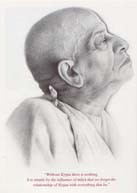
SRILA PRABHUPADA'S QUOTE OF THE DAY
Krishna Consciousness is always dormant in everyone's heart
& it can be awakened simply by service attitude. You are already allotted
a nice service & if you continue this reponsibility anywhere you live
& at the same time chant at least 16 rounds a day you will do all right
in any circumstances.
Letter to Jadurani, Calcutta 1967
Sign-up to receive these quote HERE:
mailto:haribol@pacific.net.sg

Bhaktivedanta Vedabase Network ...
http://vedabase.net/


The Scientific - Mathematical
Proof for God's existence:
http://geocities.com/sector114

http://robot-hosting.com/php/login_nicholas.html
user name = guest
password = guest
(Collection of philosophical and mathematical proofs
for existence of God can be found in this site.)

Scientifically Philosophical Books for the layman
 ...
... ...
...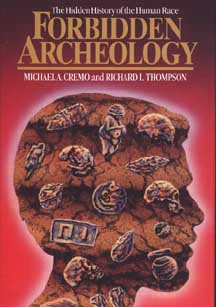 ...
...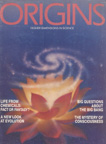
Click on any of these books to read more about them and where to get
a copy
or contact your local temple for purchases
sample of Life
comes from Life HERE.pdf

Lotus Imprints - Preserving Prabhupada's Legacy - The
Publishing House of Hari Sauri dasa
http://www.lotusimprints.com/

Quotes from Shastra - scriptures
View using Balaram font

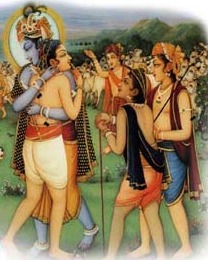

Haribodhini - Prabodhini - DevotthAni
Utthana EkAdasii
Haribodhini Ekadasi from the EkAdasii
Book:
About this EkAdasii from Hari Bhakti
Vilas - Dikdarshini tika:
Other Events today:
Bhisma Panchaka
Gaura
Kishora dasa Babaji maharaj - Tirubhav
Haribodhini Ekadasi
Lord Brahma said to Narada Muni, "Dear son, O best of
the sages, I shall narrate to you the glories of Haribodhini Ekadasi, which
eradicates all kinds of sins and bestows great merit, and ultimately liberation,
upon the wise persons who surrender unto the Supreme Lord.
"O best of the brahmanas, the merits acquired
by bathing in the Ganges remain significant only as long as Haribodhini
Ekadasi does not come. This Ekadasi, which occurs during the light
fortnight of the month of Kartika, is much more purifying than a bath in
the ocean, at a place of pilgrimage, or in a lake. This sacred Ekadasi
is more powerful in nullifying sin than one thousand Asvamedha sacrifices
and one hundred Rajasuya sacrifices."
Narada Muni inquired, "O father, please describe
the relative merits of fasting completely on Ekadasi, eating supper (without
grains or beans), or eating once at midday (without grains or beans)."
Lord Brahma replied, "If a person eats once at
midday on Ekadasi, the sins of his previous birth are erased, if he eats
supper, the sins acquired during his previous two births are removed, and
if he fasts completely, the sins accumulated during his pervious seven
births are eradicated.
"O son, whatever is only rarely achieved within
the three worlds is obtained by him who strictly observes Haribodhini Ekadasi.
A person whose sins equal Mount Sumeru in volume sees them all reduced
to nothing if he simply fasts on Papaharini Ekadasi (another name for Haribodhini
Ekadasi). The sins a person has accumulated over a thousand previous
births are burned to ashes if he not only fasts but also remains awake
throughout Ekadasi night, just as a mountain of cotton can be burned to
ashes if one lights a small fire in it.
O Narada, a person who strictly observes this
fast achieves the results I have mentioned. Even if one does a small
amount of pious activity on this day, following the rules and regulations,
one will earn merit to Mount Sumeru in volume; however a person who does
not follow the rules and regulations given in the Scriptures may perform
pious activity equal to Mount Sumeru in volume, but he will not earn even
a small amount of merit. One who does not chant the Gayatri mantra
three times a day, who disregards fast days, who does not believe in God,
who criticises the Vedic Scriptures, who thinks the Vedas bring only ruination
to one who follows their injunctions, who enjoys another's wife, who is
utterly foolish and wicked, who does not appreciate any service that has
been rendered to him, or who cheats others - such a sinful person can never
perform any religious activity effectively. Be he a brahmana or a
shudra, whoever tries to enjoy another man's wife, particularly the wife
of a twice-born person, is said to be no better than a dog-eater.
"O best of the sages, any brahmana who enjoys
sex with a widow or a brahmana lady married to another man brings ruin
to himself and his family. Any brahmana who enjoys illicit sex will
have no children in his next life, and any past merit he may have earned
is ruined. Indeed, if such a person displays any arrogance toward
a twice-born brahmana or a spiritual master, he loses all his spiritual
advancement immediately, as well as his wealth and children.
"These three kinds of men ruin their acquired
merits: he whose character is immoral, he who has sex with the wife of
a dog-eater, and he who appreciates the association of rogues. Whoever
associates with sinful people and visits their homes without a spiritual
purpose will go directly to the abode of Lord Yamaraj, the superintendent
of death. And if someone eats in such a home, his acquired merit
is destroyed, along with his fame, duration of life, children, and happiness.
"Any sinful rascal who insults a saintly person
soon loses his religiosity, economic development, and sense gratification,
and he at last burns in the fire of hell. Anyone who likes to offend
saintly persons, or who does not interrupt someone who is insulting saintly
persons, is considered no better than an ass. Such a wicked man sees
his dynasty destroyed before his very eyes.
"A person whose character is unclean, who is a
rogue or a swindler, or who always finds fault with others does not achieve
a higher destination after death, even if he gives charity generously or
performs other pious deed. Therefore one should refrain from performing
inauspicious acts and perform only pious ones, by which one will acquire
merit and avoid suffering. "However, the sins of one who, after due consideration,
decides to fast of Haribodhini Ekadasi are erased from one hundred previous
lives, and whoever fasts and remains awake overnight on this Ekadasi achieves
unlimited merit and after death goes to the supreme abode of Lord Vishnu,
and then thousand of his ancestors, relatives, and descendants also reach
that abode. Even if one's forefathers were implicated in many sins
and are suffering in hell, they still attain beautifully ornamented spiritual
bodies and happily go to Vishnu's abode.
O Narada, even one who has committed the heinous
sin of killing a brahmana is freed of all stains on his character by faster
on Haribodhini Ekadasi and remaining awake that night. The merit
that cannot by won by bathing in all the places of pilgrimage, performing
a horse sacrifice, or giving cows, gold, or fertile land in charity can
easily be achieved by fasting on this holy day and remaining awake throughout
the night.
"Anyone who observes Haribodhini Ekadasi is celebrated
as highly qualified and makes his dynasty famous. As Death is certain,
so losing one's wealth is also certain. Knowing this, O best of sages,
one should observe a fast on this day so dear to Hari - Sri Haribodhini
Ekadasi.
"All places of pilgrimage in the three worlds
at once come to reside in the house of a person who fasts on this Ekadasi.
Therefore, to please the Lord, who holds a disc in His hand, one should
give up all engagements, surrender, and observe this Ekadasi fast.
One who fasts on this Haribodhini day is acknowledged as a wise man, a
true yogi, an ascetic, and one whose senses are truly under control.
He alone enjoys this world properly, and he will certainly achieve liberation.
This Ekadasi is very dear to Lord Vishnu, and thus it is the very essence
of religiosity. Even one observance of it bestows the topmost reward
in all the three worlds.
"O Naradaji, whoever fasts on this Ekadasi will
definitely not enter a womb again, and thus faithful devotees of the Supreme
Godhead give up all varieties of religion and simply surrender to fasting
on this Ekadasi. For that great soul who honours this Ekadasi by
fasting and remaining awake throughout the night, the Supreme Lord, Sri
Govinda, personally terminates the sinful reactions that soul has acquired
by the actions of his mind, body, and words.
"O son, for anyone who bathes in a place of pilgrimage,
gives charity, chants the holy names of the Supreme Lord, undergoes austerities,
and performs sacrifices for God on Haribodhini Ekadasi, the merit thus
earned all becomes imperishable. A devotee who worships Lord Madhava
on this day with first-class paraphernalia becomes free from the great
sins of a hundred lifetimes. A person who observes this fast and
worships Lord Vishnu properly is freed from great danger.
"This Ekadasi fast pleases Lord Janardana so much
that He takes the person who observes it back to His abode, and while going
there the devotee illuminates then ten universal directions. Whoever
desires beauty and happiness should try to honour Haribodhini Ekadasi,
especially if it falls on Dvadasi. The sins of one's past hundred
births - the sins committed during childhood, youth and old age in al those
lifetimes, whether those sins are dry or wet - are nullified by the Supreme
Lord Govinda if one fasts on Haribodhini Ekadasi with devotion.
Haribodhini Ekadasi is the best Ekadasi.
Nothing is unobtainable or rare in this world for one who fasts on this
day, for it gives food grains, great wealth, and high merit, as well as
eradication of all sin, the terrible obstacle to liberation. fasting
on this Ekadasi is a thousand times better than giving charity on the day
of the solar or lunar eclipse. Again I say to you, O Naradaji, whatever
merit is earned by one who bathes in a place of pilgrimage, performs sacrifices,
and studies the Vedas is only one then-millionth the merit earned by the
person who fasts but one on Haribodhini Ekadasi. Whatever merit one
has acquired in his life by some pious activities becomes completely fruitless
if one does not observe the Ekadasi fast and worship Lord Vishnu in the
month of Kartika. Therefore, you should always worship the Supreme
Lord, Janardana, and render service to Him. Thus you will attain
the desired goal, the highest perfection.
"On Haribodhini Ekadasi, a devotee of the Lord
should not eat in another's house or eat food cooked by a non devotee.
If he does so, he achieves only the merit of fasting on a full moon day.
Philosophical discussion of Scriptures in the month of Kartika pleases
Sri Vishnu more than if one gives elephants and horses in charity or performs
a costly sacrifice. Whoever chants or hears descriptions of Lord
Vishnu's qualities and pastimes, even if but a half or even a fourth of
a verse, attains the wonderful merit derived from giving away a hundred
cows to a brahmana. O Narada, during the month of Kartika one should
give up all kinds or ordinary duties and devote one's full time and energy
especially while fasting, to discussing the transcendental pastimes of
the Supreme Lord. Such glorification of Sri Hari on the day so dear
to the Lord, Ekadasi, liberates a hundred previous generations. One
who spends his time enjoying such discussions, especially in the month
of Kartika, achieves the results of performing ten thousand fire sacrifices
and burns all his sins to ashes.
"He who hears the wonderful narrations concerning
Lord Vishnu, particularly during the month of Kartika, automatically earns
the same merit as that bestowed upon someone who donates a hundred cows
in charity. O great sage, a person who chants the glories of Lord
Hari on Ekadasi achieves the merit earned by donating seven islands."
Narada Muni asked his glorious father, "O universal
sire, I best of all demigods, please tell me how to observe this most sacred
Ekadasi. What kind of merit does it bestow upon the faithful?"
Lord Brahma replied, "O son, a person who wants
to observe this Ekadasi should rise early on Ekadasi morning, during the
brahma-muhurta hour (an hour and a half before sunrise until fifty minutes
before sunrise). He should then clean his teeth and bathe in a lake,
river, pond, or well, or in his own home, as the situation warrants.
After worshipping Lord Sri Keshava, he should listen carefully to the sacred
descriptions of the Lord. He should pray to the Lord thus:
'O Lord Keshava, I shall fast on this day, which is so dear to You, and
tomorrow I shall honour Your sacred prasadam. O lotus-eyed Lord,
O infallible one, You are my only shelter. Kindly protect me.'
"Having spoken this solemn prayer before the Lord
with great love and devotion, one should fast cheerfully. O Narada,
whoever remains awake all night on this Ekadasi, singing beautiful songs
glorifying the Lord, dancing in ecstasy, playing delightful instrumental
music for His transcendental pleasure, and reciting the pastimes of Lord
Krishna as records in bona-fide Vedic literature - such a person will most
assuredly reside far beyond the three worlds, in the eternal, spiritual
realm of God.
"On Haribodhini Ekadasi one should worship Sri
Krishna with camphor, fruits, and aromatic flowers, especially the yellow
agaru flower. One should not absorb oneself in making money on this
important day. In other words, greed should be exchanged for charity.
This is the process for turning loss into unlimited merit. One should
offer many kinds of fruits to the Lord and bathe Him with water from a
conchshell. Each of these devotional practices, when performed on
Haribodhini Ekadasi, is ten million times more beneficial than bathing
in all the places of pilgrimage and giving all forms of charity.
"Even Lord Indra joins his palm and offers his
obeisances to a devotee who worships Lord Janardana with first-class agastya
flowers of this day. The supreme Lord Hari is very pleased when he
is decorated with nice agastya flowers. O Narada, I give liberation
to one who devotedly worships Lord Krishna on this Ekadasi in the month
of Kartika with leaves of the bel tree. And for one who worships
Lord Janardana with fresh tulasi leaves and fragrant flowers during this
month, O son, I personally burn to ashes all the sins he has committed
for then thousand births.
"One who merely sees Tulasi Maharani, touches
her, mediates on her, narrates her history, offers obeisances to her, prays
to her for her grace, plants her, worships her, or waters her lives in
the abode of Lord Hari eternally. O Narada, one who serves Tulasi-devi
in these nine ways achieves happiness in the higher world for as many thousands
of yugas as there are roots and subroots growing from a mature tulasi plant.
When a full grown tulasi plant produces seeds, many plants grow from those
seeds and spread their branches, twigs, and flowers, and these flowers
also produce numerous seeds. For as many thousands of kalpas as there
are seeds produced in this way, the forefathers of one who serves tulasi
in these nine ways will live in the abode of Lord Hari.
"Those who worship Lord Keshava with kadamba flowers,
which are very pleasing to Him, get is mercy and do not see the abode of
Yamaraj, death personified. What is the use of worshipping someone
else if all desires can be fulfilled by pleasing Lord Hari? For example,
a devotee who offers Him bakula, ashoka, and patali flowers is freed from
misery and distress for as long as the sun and moon exist in this universe,
and at last he achieves liberation. O best of the brahmanas, an offering
of kannera flowers to Lord Jagannatha brings as much mercy upon the devotee
as that earned by worshipping Lord Keshava for four yugas. One who
offers tulasi flowers (manjaris) to Sri Krishna during the month of Kartika
receives more merit than can be obtained by donating ten million cows.
Even a devotional offering of newly grown sprouts of grass brings with
it a hundred times the benefit obtained by ordinary ritualistic worship
of the Supreme Lord.
"One who worships Lord Vishnu with the leaves
of the samika tree is freed from the clutches of Yamaraja, the lord of
death. One who worships Vishnu during the rainy season with champaka
or jasmine flowers never returns to the planet earth again. One who
worships the Lord with but a single kumbhi flower achieves the boon of
donating a pala of gold (two hundred grams). If a devotee offers
a single yellow flower of the ketaki, or wood-apple, tree to Lord Vishnu,
who rides on Garuda, he is freed from the sins of ten million births.
Furthermore, one who offers Lord Jagannatha flowers and also a hundred
leaves anointed with red and yellow sandalwood paste will certainly come
to reside in Svetadvipa, far beyond the coverings of this material creation.
"O greatest of brahmanas, Sri Narada, after thus
worshipping Lord Keshava, the bestower of all material and spiritual happiness,
on Haribodhini Ekadasi, one should rise early the next day, bathe in a
rive, chant japa of Krishna's holy names, and render loving devotional
service to the Lord at home to the nest of one's ability. To break
the fast, the devotee should first offer some prasadam to brahmanas and
only then, with their permission, eat some grains. Thereafter, to
please the Supreme Lord, the devotee should worship his spiritual master,
the purest of the Lord's devotees, and offer him sumptuous food, nice cloth,
gold, and cows, according to the devotee's means. this will certainly
please the Supreme Lord, the holder of the disc.
"Next the devotee should donate a cow to a brahmana,
and if the devotee has neglected some rules and regulation of spiritual
life, he should confess them before brahmana devotees of the Lord.
Then the devotee should offer them some dakshina (money). O king,
those who have eaten supper on Ekadasi should feed a brahmana the next
day. That is very pleasing to the Supreme Personality of Godhead.
"O son, if a man has fasted without asking the
permission of his priest, or if a woman has fasted without asking her husband's
permission, he or she should donate a bull to a brahmana. Honey and
yoghurt are also proper gifts for a brahmana. Someone who has fasted
from ghee should donate milk, one who has fasted from grains should donate
rice, one who has slept on the floor should donate a bedstead with a quilt,
one who has eaten on a leaf plate should donate a pot of ghee, one who
as remained silent should donate a bell, and one who has fasted from sesame
should give gold in charity and feed a brahmana couple with sumptuous food.
A man who wants to prevent baldness should donate a mirror to a brahmana,
one who has second-hand shoes should donate shoes, and one who has fasted
from salt should donate some sugar to a brahmana. During this month
everyone should regularly offer a ghee lamp to Lord Vishnu or to Srimati
Tulasidevi in a temple.
"An Ekadasi fast is complete when one offers a
qualified brahmana a gold or copper pot filled with ghee and ghee wicks,
along with eight waterpots containing some gold and covered by cloths.
One who cannot afford these gifts should at least offer a brahmana some
sweet words. One who does so will surely attain the full benefit
of fasting on Ekadasi.
"After offering his obeisances and begging permission,
the devotee should eat his meal. On this Ekadasi, Chaturmasya ends,
so whatever one gave up during Chaturmasya should now be donated to brahmanas.
One who follows this process of Chaturmasya receives unlimited merit, O
king of kings, and goes to the abode of Lord Vasudeva after death.
O king, anyone who observes the complete Chaturmasya without a break attains
eternal happiness and does not receive another birth. But if someone
breaks the fast, he becomes either a blind man or a leper.
"Thus I have narrated to you the complete process
for observing Haribodhini Ekadasi. Someone who reads or hears about
this achieves the merit earned by donating cows to a qualified brahmana."
Thus ends the narration of the glories of Karttika-sukla Ekadasi
- also known as Haribodhini Ekadasi or Devotthaani Ekadasi - from the Skanda
Purana.
This story is from how they are found in the celebrated book, "Ekadasi:
The Day of Lord Hari" 1986. HH Krishna Balaram Swami. Bhaktivedanta Institute
Press.
Prabodhini Ekadasi in Kartik:
(Sukla paksha) from Hari Bhakti Vilas - Vaishnava Smriti.
PRABODHINIM UPOSYA EVA NA GARBHE VISATE NARAH
SARVA DHARMAN PARITYAJYA TASMAT KURVITA NARADA
(HARI BHAKTI VILASA 16/289 from SKANDA PURANA spoken by Lord Brahma)
Oh Narada Muni, one who fasts on Prabodhini (when the Lord gets
up) Ekadasi, does not enter again into the womb of another mother. Therefore,
a person should give up all varieties of occupation and fast on this particular
Ekadasi day.
DUGDHABDHIH BHOGI SAYANE BHAGAVAN ANANTO
YASMIN DINE SVAPITI CA ATHA VIBHUDHYATE CA
TASMINN ANANYA MANASAM UPAVASA BHAJAM
KAMAM DADATY ABHIMATAM GARUDANKA SAYI
(HARI BHAKTI VILASA 16/293 from PADMA PURANA)
One who fasts with one pointed intelligence on the day when the
Supreme Lord Sri Hari, Who sleeps on a bed of the enemy of Garuda (snake)
goes to take rest in the Milk ocean on the bed of Ananta Sesa and also
the day He gets up, gets all of his desires fulfilled.
BHAKTIPRADA HAREH SATU NAMNA KSATA PRAVODHINI
YASA VISNOH PARA MURTIR AVYAKTA ANEKA RUPINI
SA KSIPTA MANUSE LOKE DVADADI MUNI PUNGAVA
(HARI BHAKTI VILASA 16/301 from VARAHA PURANA conversation between Yamaraja
and Narada Muni)
This Prabodhini Ekadasi is famous for rewarding devotion to Lord
Sri Hari. Oh best of the sages (Narada Muni), the personality of Ekadasi
is present on this earthly planet in an unmanifested form of Lord Hari.
Srila Sanatana Gosvami remarks in his Digdarsini-tika that one
who exactly observes the Ekadasi fast by observing this, he directly worships
Lord Sri Hari. This is the meaning of this verse. Therefore, Ekadasi is
said to be equal to Lord Sri Hari Himself.
CATUR DHA GRAHYA VAI CIRNAM CATUR MASYA VRATAM NARAH
KARTIKE SUKLAPAKSE TU DVADASYAM TAT SAMACARET
(HARI BHAKTI VILASA 16/412 from MAHABHARATA)
A person who observed Caturmasya fast stated in four different
ways should end his fast on the Dvadasi day on the light fortnight of the
month of Karttika.
EVAM YA ACARET PARTHA SOBHANAM DHARMAM APNUYAT
AVASANE TU RAJENDRA VASUDEVA PURAM VRAJET
(HARI BHAKTI VILASA 16/433 from BHAVISYA UTTARA PURANA)
Oh son of Prtha, Oh best of the kings, one who follows his vows
properly as it is stated here achieves the highest merit and at last goes
to the abode of Lord Sri Hari, the son of Vasudeva.
See Bhisma Panchaka
See Gaura
Kishora dasa Babaji maharaj
 UtpannA
EkAdasii
UtpannA
EkAdasii
Suta Goswami said, "O learned brahmanas, long ago Lord
Sri Krishna, the Supreme Personality of Godhead, explained the auspicious
glories of Sri Ekadasi and the rules and regulations governing each observance
of fasting on that holy day. O best of the brahmins, whosoever hears about
the origins and glories of these sacred fasts on the Ekadasi days goes
directly to the abode of Lord Vishnu after enjoying many different kinds
of happiness in this material world.
"Arjuna, the son of Prithaa, asked
the Lord, 'O Janardana, what are the pious benefits of complete fasting,
eating only supper, or eating but once at midday on Ekadasi, and what are
the regulations for observing the various Ekadasi days? Kindly narrate
all this to me'.
"The Supreme Lord Krishna replied,
'O Arjuna, in the beginning of winter (northern hemisphere), on the Ekadasi
that occurs during the dark fortnight of the month of Margasirsha (November-December),
a novice should begin his practice of observing a fast on Ekadasi. On Dasami,
the day before Ekadasi, he should clean his teeth nicely. Then during the
eight portion of Dasami, just as the Sun is about to set, he should eat
supper.
" 'The next morning the devotee should
make a vow, according to the rules and regulations, to observe fasting.
At midday he should bathe properly in a river, lake or small pond. A bath
in a river is most purifying, thsat taken in a lake is less so, and a bath
in a small pond is the least purifying. If neither a river, lake nor pond
is accessible, he may bathe with well-water.
"'The devotee should chant
this prayer containing the names of Mother Earth: "O Asvakrante!
O Rathakrante! O Vishnukrante! O Vasundhare! O Mrttike! O Mother Earth!
Kindly remove all the sins I have accumulated throughout my many past lives
so that I may enter the sacred abode of the Supreme Lord." As the
devotee chants, he should smear mud over his body.
"'During the day of fasting the devotee should
not speak to those who are fallen from their religious duties, to dog-eaters,
to thieves, or to hypocrites. He should also avoid speaking with
slanderers; with those who abuse the demigods, the Vedic literatures, or
brahmanas; or with any other wicked personalities, such as those who have
sex with forbidden women, those who are known plunderers, or those who
rob temples. If any such person is spoken to or even seen during
Ekadasi, one must purify oneself by looking directly at the sun.
"'Then the devotee should respectfully worship
Lord Govinda with first-class food, flowers, and so forth. In his
home he should offer the Lord a lamp in pure devotional consciousness.
he should also avoid sleeping during the daytime and should completely
abstain from sex. Fasting from all food and water, he should joyfully
sing the Lord's glories and play musical instruments for His pleasure throughout
the night. After remaining awake all night in pure consciousness,
the worshipper should give charity to qualified brahmanas and offer his
humble obeisances unto them, begging their forgiveness for his offences.
"'Those who are serious about devotional service
should consider the Ekadasis that occur during dark fortnights to be as
good as those that occur during bright fortnights. O king, one should
never discriminate between these two kinds of Ekadasi.
Please listen as I now describe the results obtained
by one who observes Ekadasi in this way. Neither the merit one receives
by taking a bath in the sacred place of pilgrimage known as Sankhoddhara,
where the Lord killed the Sankhasura demon, nor the merit one receives
upon seeing Lord Gadadhara directly is equal to one sixteenth of the merit
one obtains by fasting on Ekadasi. It is said that by giving charity
on a Monday when the moon is full, one obtains a hundred thousand times
the results of ordinary charity. O winner of wealth, one who gives
charity on the day of the sankranti (equinox) attains four hundred thousand
times the ordinary result. Yet simply by fasting on Ekadasi one obtains
all these pious results, as well as whatever pious results one gets at
Kurukshetra during an eclipse of the sun or moon. Furthermore, the
faithful soul who observes complete fasting on Ekadasi achieves a hundred
times more merit than one who performs an Asvamedha-yajna (horse sacrifice).
One who observes Ekadasi just once earns ten times more merit than
a person who gives a thousand cows in charity to a brahmana learned in
the Vedas.
"'A person who feeds just one brahmacari earns
ten times more merit than one who feeds ten good brahmanas in his own house.
But a thousand times more merit than is earned by feeding a brahmacari
is achieved by donating land to the needy and respectable brahmana, and
a thousand time more than that is earned by giving away a virgin girl in
marriage to a young, well-educated, responsible man. Ten times more
beneficial than this is educating children properly on the spiritual path,
without expecting any reward in return. Ten times better than this,
however, is giving food grains to the hungry. Indeed, giving charity
to those in need is the best of all, and there never has been or ever will
be a better charity than this. O son of Kunti, all the forefathers
and demigods in heaven become very satisfied when one gives food grains
in charity. But the merit one obtains by observing a complete fast
on Ekadasi cannot be measured. O Arjuna, best of all Kurus, the powerful
effect of this merit is inconceivable even to the demigods, and half this
merit is attained by one who eats only supper on Ekadasi.
"'One should therefore observe fasting on Lord
Hari's day either by eating only once at midday, abstaining from grains
and beans; or by fasting completely. The processes of staying in
places of pilgrimage, giving charity, and performing fire sacrifices may
boast only as long as Ekadasi has not arrived. Therefore anyone afraid
of the miseries of material existence should observe Ekadasi. On
Ekadasi one should not drink water from a conch-shell, kill living entities
such as fish or pigs, or eat any grains or beans. Thus I have described
to you, O Arjuna, the best of all methods of fasting, as you have
inquired from Me.'
"Arjuna then asked, 'O Lord, according to You,
a thousand Vedic sacrifices do not equal even one Ekadasi fast. How
can this be? How has Ekadasi become the most meritorious of all days?'
"Lord Sri Krishan replied, 'I will tell you why
Ekadasi is the most purifying of all days. In the Satya-Yuga there
once lived an amazingly fearsome demon called Mura. Always very angry,
he terrified all the demigods, defeating even Indra, the king of heaven;
Vivasvan, the sun-god; the eight Vasus; Lord Brahma; Vayu. the wind-god;
and Agni, the fire-god. With his terrible power he brought them all
under his control.
"'Lord Indra then approached Lord Shiva and said,
"We have all fallen from our planets and are now wandering helplessly on
the earth. O lord, how can we find relief from this affliction?
What will be the fate of us demigods?'
"'Lord Shiva replied, "O best of the demigods,
go to that place where Lord Vishnu, the rider of Garuda, resides.
He is Jagannatha, the master of all the universes and their shelter as
well. He is devoted to protecting all souls surrendered to Him.'"
"Lord Krishna continued, 'O Arjuna, winner of
wealth, after Lord Indra heard these words of Lord Shiva's, he proceeded
with all the demigods to the place where Lord Jagannatha, the Lord of the
universe, the protector of all souls, was resting. Seeing the Lord
sleeping upon the water, the demigods joined their palms and, led by Indra,
recite the following prayers:
"'"O Supreme Personality of Godhead, all obeisances
to You. O Lord of lords, O You who are praised by the foremost demigods,
O enemy of all demons, O lotus-eyed Lord, O Madhusudana (killer of the
Madhu demon), please protect us. Afraid of the demon Mura, we demigods
have come to take shelter of You. O Jagannatha, You are the doer
of everything and the creator of everything. You are the mother and
the father of all universes. You are the creator, the maintainer,
and the destroyer of all. You are the supreme helper of all the demigods,
and You alone can bring peace to them. you alone are the earth, the
sky, and the universal benefactor.
"'"You are Shiva, Brahma, and also Vishnu, the
maintainer of the three worlds. You are the gods of the sun, moon,
and fire. You are the clarified butter, the oblation, the sacred
fire, the mantras, the rituals, the priests, and the silent chanting of
japa. You are the sacrifice itself, its sponsor, and the enjoyer
of its results, the Supreme Personality of Godhead. Nothing within
these three worlds, whether moveable or immovable, can exist independent
of You. O Supreme Lord, Lord of lords, You are the protector of those
who take shelter of You. O supreme mystic, O shelter of the fearful,
please rescue and protect us. We demigods have been defeated by the
demons and have thus fallen from the heavenly realm. Deprived of
our positions, O Lord of the universe, we are now wandering about this
earthly planet."'
"Lord Krsna continued, 'Having heard Indra and
the other demigods speak these words, Sri Vishnu, the Supreme Personality
of Godhead, replied, "What demon possesses such great powers of delusion
that he has been able to defeat all the demigods? What is his name,
and where does he live? Where does he get his strength and shelter?
Tell Me everything, O Indra, and do not fear."
"'Lord Indra replied, "O Supreme Godhead, O Lord
of lords, O You who vanquish the fear in Your pure devotees' hearts, O
You who are so kind to your faithful servants, there was once a powerful
demon of the Brahma dynasty whose name was Nadijangha. he was extraordinarily
fearsome and wholly dedicated to destroying the demigods, and he begot
an infamous son named Mura.
"'"Mura's great capital city is Chandravati.
From that base the terribly evil and powerful Mura demon has conquered
the whole world and brought all the demigods under his control, driving
them out of their heavenly kingdom. He has assumed the roles of Indra,
the king of heaven; Agni, the fire-god; Yama, the lord of death; Vayu,
the wind-god; Isha, or Lord Shiva; Soma, the moon-god; Nairrti, the lord
of the directions; and Pasi, or Varuna, the water-god. He has also
begun emanating light in the role of the sun-god and has turned himself
into the clouds as well. It is impossible for the demigods to defeat
him. O Lord Vishnu, please kill tis demon and make the demigods victorious."
"'Hearing these words from Indra, Lord Janardana
became very angry and said, "O powerful demigods, all together you may
now advance on Mura's capital city of Chandravati." Encouraged thus,
the assembled demigods proceeded to Chandravati with Lord Hari leading
the way.
"'When Mura saw the demigods, that foremost of
demons started roaring very loudly in the company of countless thousands
of other demons, who were all holding brilliantly shining weapons.
The mighty-armed demons struck the demigods, who began abandoning the battlefield
and fleeing in the ten directions. Seeing the Supreme Lord Hrsikesha,
the master of the senses, present on the battlefield, the furious demons
rushed toward Him with various weapons in their hands. As they charged
the Lord, who holds a sword, disk, and club, He immediately pierced all
their limbs with His sharp, poisonous arrows. thus many hundred of
demons died by the Lord's hand.
"'At last the chief demon, Mura, began fighting
with the Lord. Mura used his mystic power to render useless whatever
weapons the Supreme Lord Hrsikesa unleashed. Indeed, to the demon
the weapons felt just like flowers striking him. When the Lord could
not defeat the demon even with various kinds of weapons - whether those
that are thrown or those that are held - He began fighting with His bare
hands, which were as strong as iron-studded clubs. The Lord wrestled
with Mura for one thousand celestial years and then, apparently fatigued,
left for Badarikashrama. There Lord Yogeshvara, the greatest of all
yogis, the Lord of the universe, entered a very beautiful cave named Himavati
to rest. O Dhananjaya, winner of wealth, that cave was ninety-six
miles in diameter and had only one entrance. I went there out of
fear, and also to sleep. There is no doubt about this, O son of Pandu,
for the great fight made me very tired. the demon followed Me into
that cave and, seeing Me asleep, started thinking within his heart, "Today
I will kill this slayer of all demons, Hari."
"'While the wicked-minded Mura was making plans
in this way, from My body there manifested a young girl who had a very
bright complexion. O son of Pandu, Mura saw that she was equipped
with various brilliant weapons and was ready to fight. Challenged
by that female to do battle, Mura prepared himself and then fought with
her, but he became very astonished when he saw that she fought him without
cessation. The king of the demons then said, "Who has created this
angry, fearsome girl who is fighting me so powerfully, just like a thunderbolt
falling upon me?' After saying this, the demon continued to fight
with the girl.
"'Suddenly that effulgent goddess shattered all
of Mura's weapons and in a moment deprived him of his chariot. He
ran toward her to attacker with his bare hands, but when she saw him coming
she angrily cut off his head. Thus the demon at once fell to the
ground and went to the abode of Yamaraja. The rest of the Lord's
enemies, out of fear and helplessness, entered the subterranean Patala
region.
"'Then the Supreme Lord woke up and saw the dead
demo before Him, as well as the maiden bowing down to him with joined palms.
His face expressing His astonishment, the Lord of the universe said, "Who
has killed this vicious demon? He easily defeated all the demigods,
Gandharvas, and even Indra himself, along with Indra's companions, the
Maruts, and he also defeated the Nagas (snakes), the rulers of the lower
planets. He even defeated Me, making Me hide in this cave out of
fear. Who is it that has so mercifully protected Me after I ran from
the battlefield and went to sleep in this cave?"
"'The maiden said, "It is I who have killed this
demon after appearing from Your transcendental body. Indeed, O Lord
Hari, when he saw You sleeping he wanted to kill You. Understanding
the intention of this thorn in the side of the three worlds, I killed the
evil rascal and this freed all the demigods from fear. I am Your
great maha-sakti, Your internal potency, who strikes fear into the hearts
of all Your enemies. I have killed this universally terrifying demon
to protect the three worlds. Please tell me why You are surprised
to see that this demon has been killed, O Lord."
"'The Supreme Personality of Godhead said, "O
sinless one, I am very satisfied to see that it is you who have killed
this king of the demons. In this way you have made the demigods happy,
prosperous, and full of bliss. Because you have given pleasure to
all the demigods in the three worlds, I am very pleased with you.
Ask any boon you may desire, O auspicious one. I will give it to
you without a doubt, though it be very rare among the demigods."
""The maiden said, "O Lord, if You are pleased
with me and wish to give me a boon, then give me the power to deliver from
the greatest sins that person who fasts of this day. I wish that
half the pious credit obtained by one who fasts will accrue to one who
eats only in the evening (abstaining from grains and beans), and that half
of this pious credit will be earned by one who eats only at midday.
Also, may one who strictly observes a complete fast on my appearance day,
with controlled senses, go to the abode of Lord Vishnu for one billion
kalpas after he has enjoyed all kinds of pleasures in this world.
This is the boon I desire to attain by Your mercy, my Lord, O Lord Janardana,
whether a person observes complete fasting, eats only in the evening, or
eats only at midday, please grant him a religious attitude, wealth, and
at last liberation."
"'The Supreme Personality of Godhead said, "O
most auspicious lady, what you have requested is granted. All My
devotees in this world will surely fast on your day, and thus they will
become famous throughout the three worlds and finally come and stay with
me in My abode. Because you, My transcendental potency, have appeared
on the eleventh day of the waning moon, let your name by Ekadasi.
If a person fasts on Ekadasi, I will burn up all his sins and bestow upon
him My transcendental abode.
"'"These are the days of the waxing and waning
moon that are most dear to Me: Tritiya (the third day), Ashthami (the eighth
day), Navami (the ninth day), Chaturdasi (the fourteenth day), and especially
Ekadasi (the eleventh day).
"'"The merit one attains by fasting on Ekadasi
is greater than that achieved by observing any other kind of fast or by
going to a place of pilgrimage, and even greater than that achieved by
giving charity to brahmanas. I tell you most emphatically that this
is true."
"'Having thus given the maiden His benediction,
the Supreme Lord suddenly disappeared. From that time onward the
Ekadasi day became most meritorious and famous all over the universe.
O Arjuna, if a person strictly observes Ekadasi, I kill all his enemies
and grant him the highest destination. Indeed, if a person observes
this great Ekadasi fast in any of the prescribed way, I remove all
obstacles to his spiritual progress and grant him the perfection of life.
"'Thus, O son of Prtha, I have described to you
the origin of Ekadasi. This one day removes all sins eternally.
Indeed, it is the most meritorious day for destroying all kinds of sins,
and it has appeared in order to benefit everyone in the universe by bestowing
all varieties of perfection.
"'One should not discriminate between the Ekadasis
of the waxing and waning moons; both must be observed, O Partha, and they
should not be differentiated from Maha-Dvadasi. Everyone who
fasts of Ekadasi should recognise that there is no difference between these
two Ekadasis, for they comprise the same tithi.
"'Whoever completely fasts on Ekadasi, following
the rules and regulations, will achieve the supreme abode of Lord Vishnu,
who rides upon Garuda. They are glorious who devote themselves to
Lord Vishnu and spend all their rime studying the glories of Ekadasi.
One who vows not to eat anything on Ekadasi but to eat only on the next
day achieves the same merit as one who executes a horse sacrifice.
Of this there is no doubt.
"'On Dvadasi, the day after Ekadasi, one should
pray, "O Pundarikaksha, O lotus-eyed Lord, now I will eat. Please
shelter me." After saying this, the wise devotee should offer some
flowers and water at the Lord's lotus feet and invite the Lord to eat by
chanting the eight-syllable mantra thrice. If the devotee wants
to gain the fruit of his fast, he should then drink water taken form
the sanctified vessel in which he offered water at the Lord's lotus feet.
"'On Dvadasi one must avoid sleeping during the
day, eating in another's home, eating more than once, having sex, eating
honey, eating from a bell-metal plate, eating urad-dal, and rubbing oil
on one's body. The devotee must give up these eight things on Dvadasi.
If he wants to speak to an outcaste on that day, he must purify himself
by eating a Tulasi leaf or an amalaki fruit. O best of kings, from
noon on Ekadasi until dawn on Dvadasi, one should engage himself in taking
baths, worshipping the Lord, and executing devotional activities, including
the giving of charity and the performance of fire sacrifices. If
one finds himself in difficult circumstances and cannot break the Ekadasi
fast properly on Dvadasi, one can break it by drinking water, and then
one is not at fault if he eats again after that.
"'A devotee of Lord Vishnu who day and night hears
these all-auspicious topics concerning the Lord from the mouth of another
devotee will be elevated to the Lord's planet and reside there for ten
million kalpas. And one who hears even one sentence about the
glories of Ekadasi is freed from the reactions to such sins as killing
a brahmana. There is no doubt of this. For all eternity
there will be no better way of worshiping Lord Vishnu than observing a
fast on Ekadasi.'"
Thus ends the narration of the glories of Margasirsa-krsna
Ekadasi, or Utpanna Ekadasi, from the Bhavisya-uttara Purana.
These stories are to be found in the celebrated book, "Ekadasi: The
Day of Lord Hari" 1986. pages 13 - 22. HH Krishna Balaram Swami.
Bhaktivedanta Institute Press.
Choose The Month (Vaishnava or Western), Paksha
or Ekadasi
Chaturmasya in Hari Bhakti Vilas
ITY ASASYA PRABHOR AGRE GRAHANIYAN NIYAMAM VRATI
CATURMASESU KARTAVYAM KRSNA BHAKTI VIVRDDHAYE
(HARI BHAKTI VILASA 15/113 from NAVA-PRASNA PANCARATRA)
After properly praying to the Supreme Lord near Him, one should
properly take a vow to follow the proper rules and regulations and process
of Caturmasya to increase one's devotion to Lord Sri Krsna.
EKA DASYANTU GRAHANIYAT SANKRANTAU KARKATASYA TU
ASADHYAM VA NARO BHAKTYA CATUR-MASYO DITAM VRATAM
(HARI BHAKTI VILASA 15/114, Sanat Kumara speaks)
In the month of Asadha, either on the Ekadasi when the Lord sleeps
or in Cancer Sankranti day or a full moon day, it is the duty of a fasting
person to take a vow to fast in Caturmasya with devotion, in front of the
Lord.
YO VINA NIYAMAM MARTYO VRATAM VA JAPYAM EVA VA
CATURMASYAM NAYEN MURKHO JIVANN API MRTO HI SAH
(HARI BHAKTI VILASA 15/116 from BHAVISYA PURANA)
Any person in this material world who performs Caturmasya without
following any rules and regulations, or fasts, or without chanting any
japa, such a foolish person is considered to be dead, even though alive.
SRAVANE VARJAYET SAKAM DADHI BHADRA PADE TATHA
DUGDHAM ASVAYUJE MASI KARTIKE CA AMISAM TYAJET
(HARI BHAKTI VILASA 15/117 from SKANDA PURANA, NAGARA KHANDA)
(While following Caturmasya) one should give up eating leafy vegetables
in the month of Sravana (July-August). In the month of Bhadrapada (August-September),
one should give up yogurt. In the month of Asvina (September-October) one
should give up milk and in the month of Karttika (October-November), one
should give up eating white dahl.
The Chaturmasya Vrata from Haribhakti Vilasa
15th vilasa
Chaturmasya Benefits
Bhavisya Purana- "One who passes the Chaturmasya
season without observing religious vows, austerities and chanting of japa,
such a fool although living should be considered to be a dead man."
Kanda Purana, Nagava Khunda- "In the month of shravana
(July, August) one should refrain from eating spinach. In the month
of Bhadra (August, September) of yogert in Ashvina (September, October)
milk. In Kartik (October, November) meat and urd dall.
Various vows and austerities during Chaturmasya and Their
respective results.
"O King, one who is My devotee and is fixed in vow, whether
man or woman, for the purpose of Dharma, should accept these various austerities
and observances. I shall now describe to you all of them along with their
respective results.
1) No salt—One's voice becomes sweet.
2) No oil—One's life is prolonged and gets progeny.
3) No oil massages—One's body becomes beautiful.
4) No cooking with oil—One's enemies are vanished.
5) No licorice and oil—One becomes wealthy.
6) Give up wearing unoffered flowers—One becomes a Vidyadhara
in Devapura.
7) Give up six kinds of tastes (spice, sour, bitter,
sweet, salty and harsh)—One never becomes ugly, smelly, or obtains a bad
birth.
8) Practice of yoga—One goes to Brahmaloka.
9) No betal nuts—One becomes happy.
10) No cooked food (raw fruits & Vegetables)—One
obtains purity.
11) No honey—One becomes lustrous.
12) No yogert or milk—One attains Goloka.
13) No cooking with earthen pots—One gets ... (?)
14) No hot food—One gets offspring with a long life.
15) Take rest on the ground or on stone—One becomes an
associate of Vishnu.
16) One who gives up meat & honey is a yogi and muni.
17) No intoxicating liquors—One becomes powerful and
free from disease.
18) Fast for one day—One is honored in Brahmaloka.
19) No cutting of hair and nails—One gets the benefit
of taking bath daily in Ganges.
20) No speaking of grama katha (nonsense)—One's order
will never be disobeyed.
21) Eat food on the ground without dish or plate—One
obtains a kingdom on Earth.
22) Chant the mantra Namo Narayana—One obtains the result
of giving in charity 100 times.
23) Offer prayers to the Lord—One gets the result of
giving cows in charity.
24) Touch the lotus feet of the Deity—One becomes a successful
person.
25) Clean the temple of the Lord—If one is king he remains
so for a Kalpa.
26) Circumambulating the temple three times offering
prayers—At the time of death one will mount a swan airplane and go to Vaikuntha.
27) Singing or playing musical instruments in the temple
of the Lord—One goes to Gardharvaloka.
28) Take pleasure in studying the sastras—One goes to
Vishnuloka.
29) Sprinkle water in the temple—One goes to apsaraloka.
30) Take bath in a holy place—One's body becomes pure.
31) Worship Lord Vishnu with flowers—One goes to Vaikuntha.
32) Eat panchagavya—One gets the result of observing
candrayana fasting.
33) Eat one meal a day—One gets the results of performing
an Agnihotra.
34) Eat at night only—One gets the result of going to
all the places of pilgrimage.
35) Eat at noon only—One attains Devaloka.
36) Take food not obtained by begging or any extraneous
endeavor—One gets the results of opening water stands and digging wells.
37) Take bath daily—One will never see hell.
38) No eating on a plate—One gets the result of bathing
at Pushkara
39) Eat on a leaf—One obtains the result of living at
Kurukshetra.
40) Eat on a stone—One obtains the result of bathing
at Prayog.
41) Giving up drinking to six hours—One will not be attacked
by diseases.
42) During the Chaturmasya, garlands, caranamrta, candana
and water from the conshell of the Lord, mahaprasädam, Deity garlands
must be accepted.
In this way one who performs this vrata for the satisfaction
of Lord Kesava becomes satisfied himself. O best of the Pandavas, among
My devotees, he who accepts these vows and austerities during the Chaturmasya
goes to my abode at the time of death, of this there is no doubt.
Vishnu Rahasya- Lord Brahma to Narada Muni.
If one accepts all these Vaisnava austerities and
observances with devotion, one attains the supreme destination O Narada.
One who desires within himself to execute all these Vaisnava austerities
and vows, his sins obtained within one hundred births is destroyed. If
one is exclusively devoted, peaceful, takes daily bath, is fixed in vow
and worships the Lord during these four months, he goes to the abode of
the Lord. He who accepts the austerity of sleeping on the ground this time
when the Vishnu Deity is sleeping in yoga nidra underwater, he goes to
the abode of Laxmi.
Read more about vrata, sankalpa and Chaturmasya in general
HERE
Chaturmasya-info-Madhwas.html
Chaturmasya-vrata.html

Courtesy of http://www.vedabase.com/
used
with permission









![]()
![]()
![]()
![]()
![]()

![]()
![]()
![]()
![]()

![]()
![]()
![]()
![]()


















